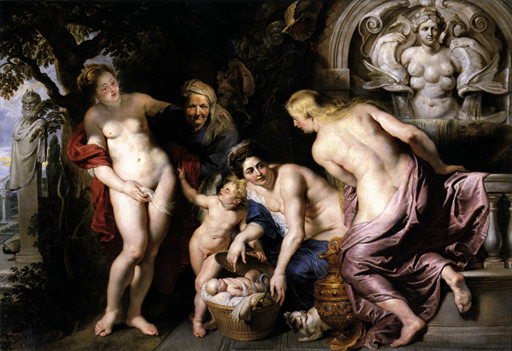1 Births in ancient mythology
Ancient Greek mythology contains many stories of unusual conceptions. For example, Hera, the wife of Zeus, became pregnant by eating lettuce; the milky white fluid found in lettuce stems was thought to resemble semen. In some versions of the story, she did this to show that Zeus was not the only one who could give birth on his own, something which he did when he ate his pregnant lover, Metis, and then gave birth to their daughter, Athene, from his own head. However, while Athene was a powerful goddess, Hephaistos – born only of the female – was lame. You will return to Hephaistos in Week 6, but it’s significant that there was no male contribution to his conception.
There were different theories in the ancient world about what exactly it was that male and female parents contributed to conceiving a child. In some versions, men provided seed, and this was what gave the baby its identity and even its shape. Women only provided the blood, the raw material on which the seed would act. In other versions, both men and women provided seed, but men’s seed was thicker and stronger. One model had a scale running from the very manly boy to the very feminine girl, with other possibilities – the feminine boy, or the ‘tomboy’ girl – in between. The child that was produced depended on the balance of the contributions of seed from the father and the mother, both in quality and quantity.
The so-called ‘mother’ is not a parent of the child, only the nurse of the newly-begotten embryo. The parent is he who mounts; the female keeps the offspring safe, like a stranger on behalf of a stranger, for those in whose case this is not prevented by god. I shall give you powerful proof of this statement. A father can procreate without a mother: a witness to this is here close by us [indicating Athene], the daughter of Olympian Zeus, who was not even nurtured in the darkness of a womb, but is such an offspring as no female divinity could ever bring forth.
It is not known how the audience of the play would have responded to this; would they have nodded their heads in agreement? In the context of the play, Apollo’s arguments are getting increasingly desperate, plus the members of the jury to whom he speaks in the play do not all accept what he says. His comment that Athene was not ‘nurtured in a womb’ is also misleading, as she was conceived normally by Metis before Zeus decided to swallow her because he was afraid of a prophecy which said she would give birth to a son greater than his father.
In myths of Erichthonios, a legendary king of Athens, he was born from Earth (the goddess Gaia). In some versions, his conception was the result of the lame god Hephaistos chasing the goddess Athene, who had sworn to remain a virgin. Hephaistos’ seed fell on the earth and made Gaia pregnant. Athene received the baby from Gaia and hid him in a box, giving this to the three daughters of King Cecrops. While in the box, Erichthonios would gradually become immortal. Two of the girls obeyed the instructions not to open the box, but the third did not. This meant the immortality plan failed, and the boy was then brought up by Athene and eventually became king.

